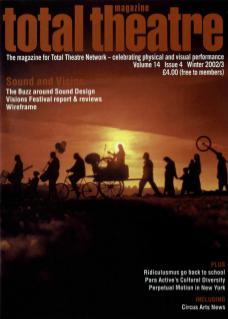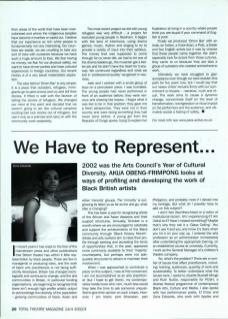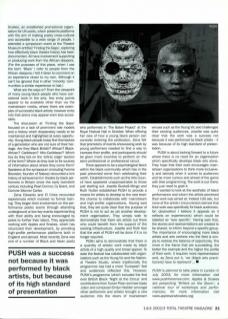In recent years it has crept to the fore of the mainstream press and other publications that British theatre has within it little representation by black people. There are few in managerial or producing roles, and the work of black arts practitioners is not being sufficiently developed. Britain has changed sociologically and continues to change, and the arts communities in Britain, in particular funding organisations, are beginning to recognise that there isn't enough high-profile artistic output to acknowledge the diversity of the population – growing communities of black, Asian and other 'minority’ groups. The ‘minority' is outgrowing its label; so as far as the arts go, what else is changing?
This has been a year for recognising artists of the African and Asian diaspora and their support structures. Annually, October is a month where we are encouraged to celebrate and support the achievements of the Black community through 'Black History Month'. Artists and arts workers aim to raise their profile through seeking and accepting the kinds of opportunities that, in the past, appeared more commonly available to their majority counterparts, but perhaps were not adequately structured to attract or maintain their involvement.
When I was approached to contribute a piece on this subject, I was at first concerned. I am not accomplished as an arts practitioner (but I hope to get there), my contemporaries hardly know who I am, much less would they take the time to ask someone unqualified to give their opinion on such a topic. However, I am black; part Ghanaian, part Philippino, and probably more if I delved into my heritage. But what do I possibly have to add on this subject?
I don't feel disenfranchised or a victim of institutional racism. Am I experiencing it? Am I blind to it? Have I missed something? Maybe that's why they call it a 'Glass Ceiling'. You don't see it and you only know it's there when you hit it on your way up. I entered the arts profession as an administrator immediately after undertaking the appropriate training, on an established course at university. Currently, I work as the General Manager of a children's theatre company.
So, what's the problem? There are a number of issues that affect practitioners, including: training, audiences, quantity of work and sustainability. To better understand what the issues were, I spoke to Josette Bushell-Mingo and Ruth Nutter, responsible for PUSH, a diverse festival programme of contemporary Black Arts, Culture and Media. I also spoke with two performance poets, El Crisis and Zena Edwards, who work with Apples and Snakes, an established promotional organisation for UK poets, which presents platforms with the aim of making poetry cross-cultural and accessible to a wide range of people. I attended a symposium event at the Theatre Museum entitled 'Finding the Gaps', exploring how effectively black theatre history has been documented. All have involvement supporting or producing work from the African diaspora. (For the purposes of this piece, when I use the term 'Black' I refer to people from the African diaspora; I felt it fairer to comment on an experience closer to my own. Although it can't be ignored that in other 'minority' communities a similar experience is had.)
What are the ways in? From the viewpoint of many young black people who have considered work in the arts, few entry points appear to be available other than via the mainstream media, where there are examples of successful black artists; however, entry into that arena may appear even less accessible.
The discussion at Finding the Gaps focused on a lack of prominent role models and a history which desperately needs to be maintained and highlighted at every opportunity. Young black people today find themselves of a generation who are not sure of their heritage. Are they Black British? African? Black African? Caribbean? Afro-Caribbean? Which box do they tick on the 'ethnic origin' section of the form? Where do they look to for sources of information about where they come from? Speakers at the symposium (including Yvonne Brewster, founder of Talawa) recounted a rich history of achievement in theatre by black performers in Britain since the early twentieth century including Pearl Connor, Cy Grant, and Corinne Skinner Carter.
PUSH was a success not because it was performed by black artists, but because of its high standard of presentation.
Zena Edwards and El Crisis recounted experiences which involved no formal training. They began their involvement on the performance poetry scene through attending underground or low-key events, experimenting with their ability and being encouraged by peers to further their talent. They appreciate working with Apples and Snakes, which has structured their development, by providing high-profile performance platforms both in England and abroad. Most recently Zena was one of a number of Black and Asian poets who performed in The Babel Project at the Royal Festival Hall in October. When offering her view of how a young black person can consider entering the profession, Zena felt that promoters of events showcasing work by young performers needed to find a way to increase their profile, and participants should be given more incentive to perform on the semi-professional or professional circuit.
There appears to be a psychological block within the black community which has in the past prevented some from celebrating their worth. Establishments such as the Arts Council have appeared unapproachable to those just starting out. Josette Bushell-Mingo and Ruth Nutter established PUSH to provide a means for artists to develop to the next level: the chance to collaborate with mainstream and high-profile organisations. Having said that, they are quite clear that the purpose of PUSH is not to act as yet another development organisation. They simply wish to demonstrate that there are artists out there who could benefit from the support of the existing infrastructure. Josette and Ruth feel that the work of PUSH will be done if it is no longer required.
PUSH aims to demonstrate that there is a quantity of artistic work made by black artists of a high quality and broad appeal. To date the festival has collaborated with organisations such as the Young Vic and the National Theatre Studio, where traditionally the programme has had a more 'European' feel and audiences reflected this. However, PUSH's programme (which included the first ever British Black 'Night at the Circus' and contributions from Turner Prize nominee Isaac Julien and composer Errolyn Walden amongst other performers and artists) brought a new audience into the doors of mainstream venues such as the Young Vic and challenged their existing audiences. Josette was quite clear that the work was a success not because it was performed by black artists – it was because of its high standard of presentation.
PUSH is about looking forward to a future where there is no need for an organisation which specifically develops black arts alone. They hope that their work encourages mainstream organisations to think more inclusively and laterally when it comes to audiences and be more curious and ahead of the game with their programming. The work is out there, they just need to grab it.
I wanted to look at the aesthetic of black performance and whom the artists perceived their work was aimed at. Indeed I did ask, but none of the artists I encountered claimed that their work was specifically for black audiences. On observation I believe it appeals as it reflects on experience(s) which could be labelled as 'race specific'. Having said that, the stories and representations are created to be shared, to inform beyond a specific group. The importance of encouraging more black artists and arts workers into the field is simply to redress the balance of opportunity. The more in the frame that are succeeding, the better the example and the higher the profile of their work. It requires more representation and, as Zena put it, 'we [black arts practitioners] have to represent'...
PUSH is planned to take place in London in July 2003; for more information visit www.pushherenow.com. Apples & Snakes are presenting Writers on the Storm, a national tour of workshops and performances; for more information visit www.applesandsnakes.org


